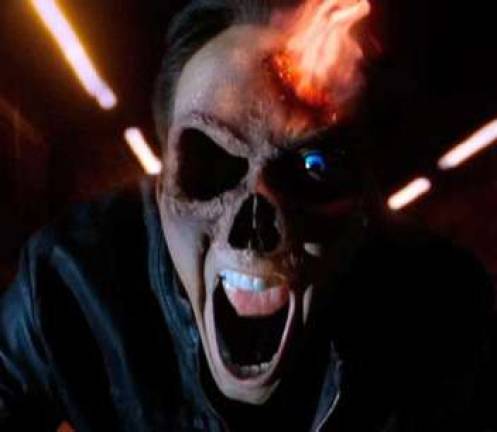City Arts: Ghost Rider Redeems and Critiques

If the filmmaking team Mark Neveldine and Brian Taylor wrote out their thoughts on how contemporary pop has traduced fun, warped thrills and debased energy in the art form they love, it would be a great provocative piece of criticism-although few film publications would want such a principled view of the destructive entertainment that's routinely sold to the public. That means this wildly sophisticated team remains obscure (and perplexing to some), but their new filmGhost Rider: Spirit of Vengeanceought to be the movie news of the week.
Ostensibly a sequel,Spirit of Vengeanceturns Marvel's death-and-actionGhost Ridercomic book franchise into more than just an entertainment: It's a spot-on cultural assessment. Neveldine-Taylor use the story of badass biker John Blaze (Nicholas Cage) saving a child from the devil for a modern Redemption allegory.
Neveldine-Taylor redeem cinema unexpectedly by pushing its commercial extremes: outré violence and sarcasm (coin of the Tarantino/video game realm) where horror and comedy mix, as in their two terrificCrankmovies.Spirit of Vengeanceisn't the perfect introduction to Neveldine-Taylor's cynical brilliance but it claries their method: They are the only filmmakers interested in simultaneously mastering genre technique, pursuing an on-going cultural critique and laughing.
After the troubledJonah Hexproject (which Neveldine-Taylor wrote without directing), their gallows humor finds the basic Faustelement inGhost Rider. When John Blaze reneges on his deal with the devil, Neveldine-Taylor trace his madness to our sped-up, digital-age culture. Tarantino exploits vengeance but Neveldine-Taylor explore the ramifications of the "Lust to punish" in today's berserk world-a criminals-and-monks allegory for how media mavens and private citizens act vengefully without humility or compassion.
Neveldine-Taylor's moral clarity seems paradoxical given their hyperbolic, deliberately trashy-looking style, but there's old-fashioned satisfaction to the way they connect modern nihilism to a classic theme. Concerned with the preservation of human values, they express them when angel Moreau (Idris Elba) enlists Blaze to protect Danny (Fergus Riordan) from the satanic clutches of Roarke (Ciaran Hinds). They work through contemporary decadence the same way medieval artists did. Like theCrankmovies,GamerandJonah Hex,Spirit of Vengeancesatirizes purgatory.
To read the full review from City Arts editor Armond White, click here.